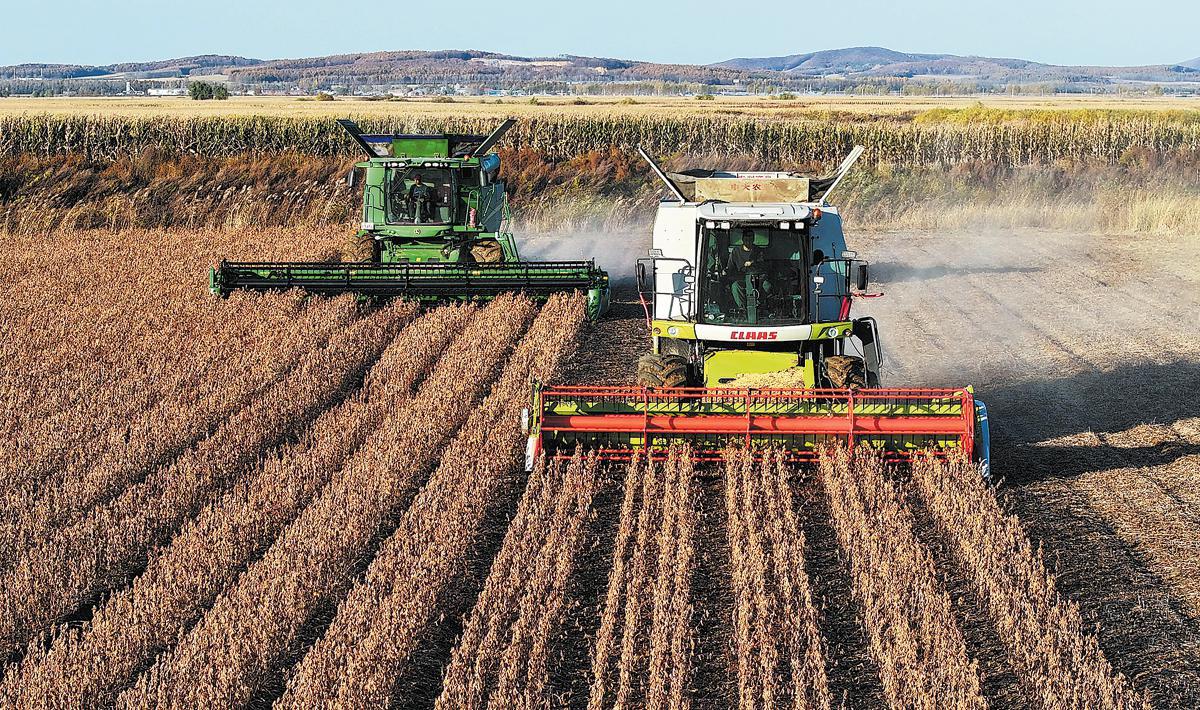China's breadbasket province hits record grain output
China Daily, December 17, 2024 Adjust font size:

HARBIN — Northeast China's Heilongjiang province, known as the country's "grain barn", produced about 80 million metric tons of grain this year, maintaining its role as China's top grain producer for 15 years in a row, official data showed on Saturday.
According to the National Bureau of Statistics, Heilongjiang's grain output exceeded 80 million tons for the first time, accounting for 11 percent of the country's total.
This year's harvest was hard won, challenged with the strenuous tasks of boosting soybean production and dealing with extreme weather that caused multiple natural disasters, inflicting losses in some grain-producing areas, said Pang Haitao, director of the provincial department of agriculture and rural affairs.
He attributed the harvest to black soil conservation measures, the cultivation of high-quality seeds, and modern agricultural management. The province plans to lift its grain production to 90 million tons by 2026 to help safeguard the country's food security.
Soybean production
As the country's largest soybean-producing province, Heilongjiang has been a pioneer in boosting domestic production to reduce the country's reliance on imports.
China's soybean planting area remained above 10 million hectares this year, and the output is expected to exceed 20 million tons for the third consecutive year.
Wang Xiaohui, chief analyst of the China National Grain and Oils Information Center, said that the price of domestic soybeans with low protein content in Heilongjiang has dropped below that of imported soybeans. Such soybeans are good for oil-pressing, and their growers have reported better profits from last year.
Liu He, a grain grower in Youyi county, made a bold choice to grow a new variety of soybean this year after examining the crop growth in an agricultural demonstration field last year.
"I was impressed by the growth of the Heinong 87 soybean variety in the demonstration base and decided to try it in my field this year. It yielded 4,000 kilograms per hectare for me, much higher than the varieties I planted before," he said.
Modern agriculture
At the beginning of the year, the provincial agricultural department issued a list of 135 recommended high-quality varieties of major crops. There are 16 crop breeding demonstration bases in the province, where farmers can check the crops in the field before selecting the right seeds.
Over the years, Heilongjiang's provincial government has allocated 300 million yuan ($41.2 million) annually to support the development of the seed industry, said Meng Linghui, an official of the Heilongjiang Provincial Department of Agriculture and Rural Affairs.
Meanwhile, reinforcing disaster resistance is crucial for ensuring the province's bumper harvest.
During spring sowing, a cold spell and rainy weather hit Hailun city, Heilongjiang, freezing seedlings. The local authority immediately launched emergency disaster relief, helping farmers purchase seeds for replanting. During summer flooding, 89 large and medium-sized reservoirs in the province prevented 2.23 billion cubic meters of water from flooding some 56,900 hectares of farmland.
According to the province's agricultural department, Heilongjiang has developed over 8 million hectares of high-standard farmland that boast sound soil conditions for grain cultivation and are resilient to drought and flooding.
As of the end of July, Heilongjiang had 11.4 million hectares of grain covered by agricultural insurance this year, an increase of 4.3 percent year-on-year.
Han Zhimin, a corn farmer in Yilan county, was a victim of the summer flood.
"Agricultural insurance paid me more than 6,000 yuan per hectare for severely affected corn plots, which helped dismiss my worries about the planting risks," said Han.